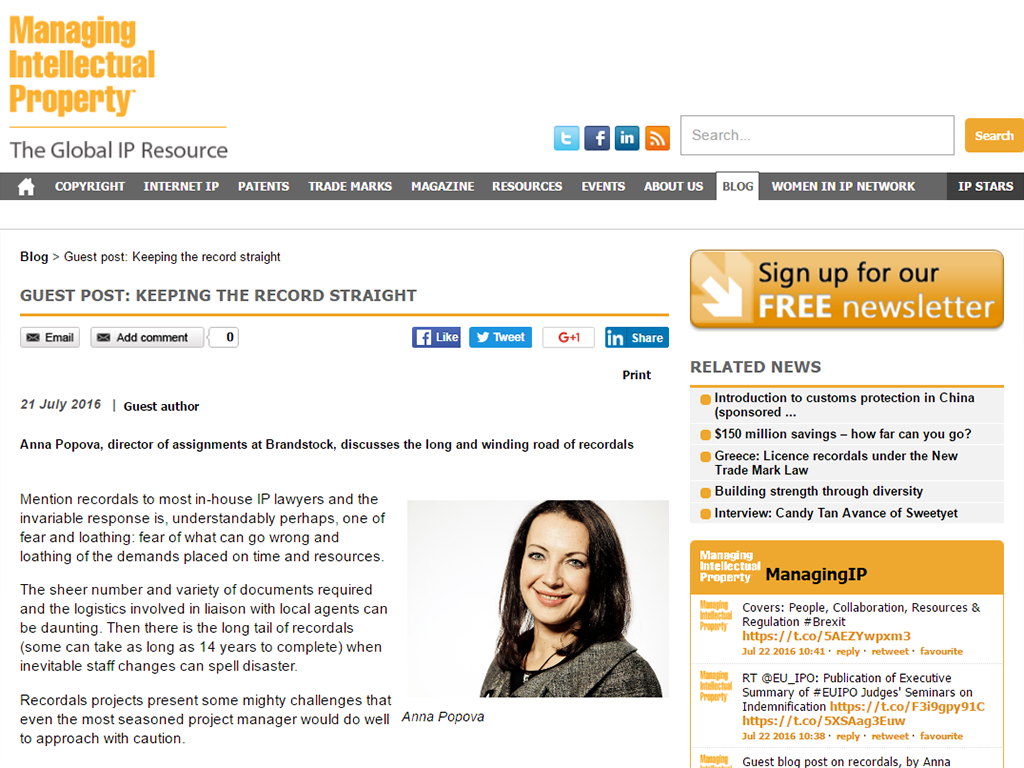Although data protection laws vary according to the country, there are, generally, certain types of personal information which should never be made public, including featuring in intellectual property (IP) records. As IP records are published publicly, it is advised that any form of sensitive or personal information is not included in such, as this may lead to the risk of fraud or theft, as well as having potentially damaging effects on business.
Aside from necessary contact information, such as a name and address – either of a natural or legal entity – any other information which is not relevant to the IP asset is not needed in the record. For example, contact details such as an address or PO Box, contact number and email address are useful in enabling people to get in contact regarding the extent of the IP rights or to discuss potential license agreements.
Want to know more?
Download our ebook on IP Rights in Mergers and Acquisitions
However, beyond this, companies should be wary of the level of personal information included in intellectual property records, with particular attention paid to their financial details, social security details and other sensitive information.
Financial information
Information such as account numbers, credit card numbers and security codes should not be included in IP records.
As previously mentioned, the purpose of the publication of intellectual property records is to enable both the public and competitors to be aware of the details of relevant IP, and to know the contact details of the owner for marketing purposes. The inclusion of any form of financial information does nothing to aid in the fulfillment of this purpose and is therefore unnecessary and high-risk.
Moreover, with credit card fraud costing countries like the UK and the US hundreds of millions of dollars each year, the rationale for not including financial information in the records is clear. In recognising these risks associated with financial information, the US Patents and Trademark Office (USPTO) maintains that bank details and credit card information shall be removed immediately if found to be included in IP records.
Identifying information
It is advisable to avoid also other identifying personal information such as social security or national insurance numbers. Used as a means for national identification and tax purposes, these numbers are individual to their owners, and thus represent a potential risk if disclosed publicly. Similarly, driver’s licenses should also not be included, as these, too, are a means of personal identification.
Again, the inclusion of identifying information in IP records does nothing to further their purpose and instead creates an unnecessary risk of fraud. It is therefore understandable that the USPTO also holds that any social security numbers or driver’s licences included in the records will be removed immediately.
Sensitive information
Known under the UK Data Protection Act as “sensitive information”, personal details about a person’s character should not be included in IP records. Including features such as a person’s ethnicity, religion, health or political affiliations in a public record is not advised.
However, unlike with both financial and identifying information, this sensitive information is not excluded due to fears of fraud or theft, but in the interests of non-discrimination. The publication of this type of information is expressly prohibited in the UK and many other territories without due cause, because of the potential effects of such information.
With regards to intellectual property records, in particular, it is advised that this sort of personal information is not included as sales may be adversely affected if potential consumers dislike these details. This relates in particular to controversial information, such as inclusions of political or religious beliefs, as an expression of one may have potentially disadvantageous effects on sales figures if consumers oppose them.
It is therefore advised not to include financial and other personal details, aside from necessary information such as a name, address and contact information. Due to of the public nature of these records, the inclusion of such personal information opens the owner and the company up to the unnecessary risk of fraud, theft or discrimination.




































